Contents
What is Narcissistic Manipulation?

A narcissistic manipulation is a form of emotional abuse that is difficult to detect. Narcissists will often use their insecurities and need for attention to manipulate the people around them. They do this by deliberately seeking out relationships with people they can easily control, or who are less intelligent than themselves. This type of person will also take advantage of others’ good intentions, using guilt trips and other forms of coercion to get what they want from healthy individuals. This article covers 10 different types of narcissists you should watch out for, so you know how to protect yourself against narcissistic abuse!
10 Types Of Narcissistic Manipulation

The Narcissistic Father
A narcissist may have one golden child, while the other siblings are getting poor treatment. The children will often compete with each other for their father’s approval and love. This type of narcissistic parent will use his favored child to get what they want from others, especially if that favoritism does not reciprocate.
The Grandiose Narcissist
This type of narcissist is often very easy to spot, as they like to draw attention to themselves and their accomplishments. They may also have a sense of entitlement, expecting others to cater to them and meet all of their needs. These individuals can be demanding and aggressive when they do not get what they want.
The Covert Narcissist
This type of narcissist often acts like a victim and will claim that the world around them is unfair or always against them. They may also be very manipulative in their interactions with others, using guilt trips to control people who are close to them. This individual might appear very shy but will quickly turn on the charm when it suits their needs.
The Compensatory Narcissist
This type of narcissist is over-compensating for a lack of self-esteem and confidence in their abilities. They might also be lacking some aspect of identity that they are trying to make up with excessive behavior or pride in their accomplishments. This person is often insecure and can easily get into reciprocation by others who are more confident than them.
The Vulnerable Narcissist
This type of narcissist is the most likely to be in a relationship with a Covert Narcissist, as they share many of the same characteristics. The vulnerable narcissist may appear shy or insecure and is often very easily manipulated. They are also prone to self-doubt and will often feel like they are not good enough for their partner or friends.
The Entitled Narcissist
This type of narcissist feels that they deserve special treatment because of who they are. They may expect others to give them things without doing anything in return, or they may feel like their status should allow them to get preferential treatment. This type of narcissist is also very likely to lash out when others do not give in to their demands quickly enough.
The Narcissistic Sociopath
This type of narcissist is out for themselves and will often manipulate others to gain social status or anything else that can benefit them. They are very charming, but also very dangerous because their lack of empathy makes it easy for them to commit terrible acts without feeling any guilt.
The Malignant Narcissist
This type of narcissist is the worst kind, as they often have no conscience and no remorse for their actions. They are also very likely to be paranoid and jealous, which can make them even more dangerous to be around. This person often has a grandiose view of themselves and can be very destructive to those around them.
The Communal Narcissist
This type of narcissist is often found in groups or organizations, where they can be the center of attention. They may need to feel superior to others and will often make themselves look good at the expense of others. This person often has no sense of right or wrong and sees other people as objects that can be used to meet their own needs.
The Sadistic Narcissist
This type of narcissist enjoys the power they have over others and often takes pleasure in causing pain. They may be very aggressive and demanding, or they might use manipulation to control those around them. This person is often very dangerous and should be avoided if possible.
Narcissistic manipulation can take many different forms, but all have the same goal: to control and dominate others. It’s important to be able to identify these types of narcissists so that you can protect yourself from their manipulative behavior. If you or someone you know is being manipulated by a narcissist, it’s important to get help before the problem gets worse.
How To Avoid

Here is a list of things that you can do to avoid narcissistic manipulation:
- Do not allow yourself to be isolated from others and keep up your relationships with friends and family members. Narcissists often try to separate people so they are easier to control, but it’s important not to let this happen if possible.
- Do not give in to their demands or requests, no matter how small they may seem. Narcissists often try to get people to do things for them so they have more power over others and it’s important not to let this happen if possible.
- Always stay true to yourself and your own beliefs. If you start changing your opinions or feelings to make someone else happy, they will know that they can manipulate you.
- Do not take the blame for things that are out of your control. Narcissists often try to shift responsibility onto others so they have more power over them and it’s important not to let this happen if possible.
- If you feel like someone is trying to manipulate you, it’s important to get help. Talk to someone you trust about what is going on and don’t try to deal with the situation on your own.
Narcissistic manipulation can take many different forms, but all have the same goal: to control and dominate others. Narcissists try to make you do what they want. They might trick you. It is important to know how narcissists work so that you can protect yourself from them. If someone is being tricked by a narcissist, help them before the problem gets worse.
Negative Impacts
Narcissistic manipulation hurts both the person being manipulated and everyone around them. The narcissist may get what they want, but it comes at the expense of another person’s feelings or boundaries.
- The person who is being manipulated might feel embarrassed by how they’ve acted in front of others. They may also begin to doubt themselves and their judgment.
- The people close to the narcissist often end up feeling drained and frustrated. They may feel like they are walking on eggshells around the narcissist, never knowing what might set them off.
- If a narcissist is manipulating you, it’s important to remember that you are not alone. Many others have been in your shoes and know how difficult it can be. Reach out and get the support you need so that you can protect yourself from narcissistic manipulation.
Protecting Yourself Against Narcissistic Manipulation
Knowing the different types of narcissists can help you protect yourself against their manipulative behavior. If you know what to look for, you can spot a narcissist before they have a chance to manipulate you. A relationship with a narcissist can be very hard. They will do things that make you feel bad.
To protect yourself from narcissistic manipulation, it is important to stay aware of any red flags that might give away manipulative behavior. If someone does something that you don’t want, they are being selfish. They might take advantage of you. People who truly care about your well-being will be willing to compromise with you when making decisions together.
If someone thinks they are better than others, it comes out as narcissistic behavior. This type of person loves to be the center of attention and will often put themselves above others. They may also have a history of manipulation and control in past relationships.
It is important to speak up if someone is making you feel uncomfortable. And it is important to set limits so that they can’t push your boundaries too far. It can be hard to stand up against a narcissist, but remember that you have the right to your feelings and opinions. Don’t let someone else control how you feel or what you do.
If a narcissist manipulates you, it’s important to reach out for help. There are many resources available to help victims of narcissistic manipulation, including support groups and counseling.
Reasons For Narcissistic Manipulation
There are many different reasons why a narcissist might choose to manipulate someone.
- They may want to feel superior and powerful, or they may simply enjoy the control it gives them over others.
- Some narcissists may be trying to cover up their feelings of insecurity or self-doubt.
- Others may raise in a household where manipulation was a way to get what they wanted.
No matter what the reason, narcissistic manipulation is never okay. You are not responsible for someone else’s behavior. Don’t let them make you do something that makes you feel bad.
Conclusion
This blog post has given you some insight into what it might be like to experience the narcissistic mind and how this can affect relationships. If you have a partner, friend or family member who is experiencing narcissism in their life then we encourage you share these insights with them and offer support for them as they work out how best to address this issue. You may wish to call one of our therapists so that they can help assess if there are any other issues which need addressing such as depression, anxiety or addiction. Our psychologists will also provide recommendations on self-care strategies so please contact us today if you would like more information about how we could assist your loved ones through recovery from narcissistic abuse!
If you are looking for affordable Online Counseling MantraCare can help: Book a trial therapy session




